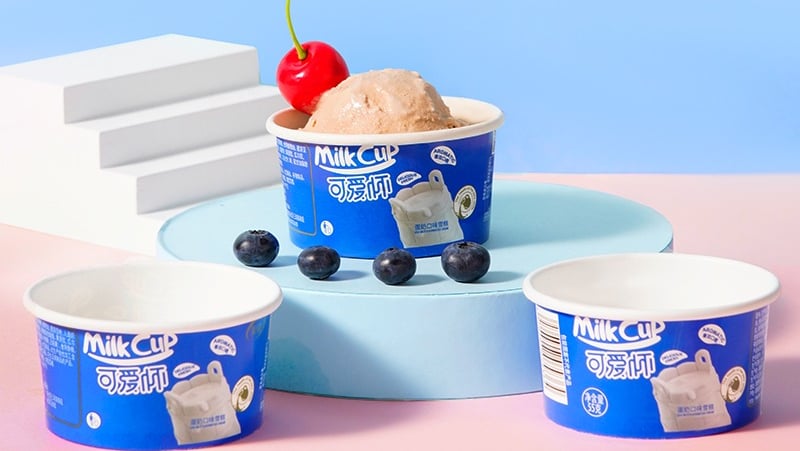The Environmental Advantages of Ice Cream Paper Cups
8/5/20244 min read


Introduction to Ice Cream Paper Cups
Ice cream paper cups have surged in popularity as an eco-friendly alternative to traditional plastic containers. These innovative containers are crafted primarily from paper, a renewable resource, making them a more sustainable choice. Increasing awareness about plastic pollution and environmental conservation has driven both consumers and businesses towards adopting more sustainable practices. As a result, ice cream paper cups have become a preferred choice for many.
The composition of these paper cups generally includes a paperboard base, which serves as the primary structural component, and a thin plastic or natural coating for waterproofing. This minimal use of plastic or biodegradable alternatives helps reduce the overall environmental impact. Additionally, many of these cups are designed to be recyclable, further supporting eco-conscious initiatives.
One of the key reasons behind the shift towards ice cream paper cups is their reduced carbon footprint. The production process of paper cups is less intensive compared to plastic, utilizing fewer non-renewable resources and generating lower greenhouse gas emissions. This aligns with the growing consumer demand for products that are not only functional but also environmentally responsible.
For businesses, adopting ice cream paper cups can enhance brand image and appeal to a more environmentally conscious customer base. Companies that prioritize sustainable practices can differentiate themselves in a competitive market, gaining customer loyalty and potentially attracting a new demographic that values sustainability.
Moreover, the versatility of ice cream paper cups cannot be overlooked. They can be customized with branding, colors, and designs, making them not only a practical choice but also a marketing tool. This adaptability allows businesses to maintain their brand identity while committing to eco-friendly practices.
In conclusion, the rising popularity of ice cream paper cups highlights a significant shift towards sustainability in consumer behavior and business practices. These cups offer a viable and attractive alternative to plastic, aligning with environmental goals while meeting the functional needs of both customers and enterprises.
Environmental Benefits of Paper Cups
When considering the shift towards more sustainable packaging options, the advantages of using paper cups over plastic cups are multi-faceted. A significant environmental benefit of paper cups comes from their production process. Typically made from wood pulp, these cups are often sourced from sustainably managed forests. Sustainable forestry practices ensure that for every tree harvested, several more are planted or naturally regenerated, making wood pulp a renewable resource. This not only maintains but also enhances forest ecosystems, providing a consistent source of materials without depleting natural resources.
Another noteworthy environmental benefit of paper cups is their biodegradability. Unlike plastic cups, which can take hundreds of years to decompose, paper cups break down much more quickly and facilitate natural recycling processes. When disposed of properly, paper cups can decompose within a few months, substantially reducing their ecological footprint. This biodegradable nature significantly lessens the accumulation of waste in landfills, where plastic cups would otherwise contribute to long-term pollution.
Moreover, paper cups offer enhanced recyclability. Post-consumer paper cups can be efficiently processed and repurposed into new products, ranging from recycled paper to secondary packaging materials. This closed-loop system minimizes waste and supports the circular economy, contrasting sharply with the fate of plastic cups, which are often non-recyclable due to contamination and mixed material composition. As a result, the recycling rate for paper cups is considerably higher than that for plastic cups.
The transition from plastic to paper cups also helps in significantly lowering the levels of harmful microplastics released into the environment. Microplastics have been found in oceans, rivers, and even in the food chain, posing threats to wildlife and human health. By opting for paper cups, we reduce reliance on plastics and mitigate these associated risks.
In essence, the adoption of paper cups over plastic supports a more sustainable and environmentally friendly approach by leveraging renewable resources, enabling biodegradability and enhancing recyclability. These factors collectively contribute to reducing pollution and waste, demonstrating a clear preference for paper cups in the pursuit of environmental conservation.
Case Studies and Real-world Examples
In recent years, numerous companies in the ice cream industry have transitioned to using paper cups, showcasing the environmental advantages of this eco-friendly choice. One prominent example is a small business in Oregon, "Sweet Scoops," that replaced its plastic containers with paper cups. This switch significantly reduced their plastic waste, winning them praise from both customers and local environmental groups. As a result, Sweet Scoops saw a boost in customer loyalty and foot traffic, successfully establishing themselves as a responsible, eco-conscious brand.
Beyond small businesses, major corporations have also embraced this change. "Frosty Treats," a nationwide ice cream chain, adopted paper cups two years ago. They reported a considerable reduction in their environmental footprint, estimating that they prevented thousands of tons of plastic from entering landfills. Frosty Treats didn't just stop at paper cups; they even started using compostable lids and spoons, making a comprehensive shift toward sustainability. Customers have responded positively to these efforts, appreciating the company’s dedication to planetary health.
Testimonials from consumers have highlighted the positive reception toward these changes. Jane Doe, a loyal Frosty Treats customer, stated, "Knowing that my favorite ice cream spot is committed to reducing plastic waste makes every scoop even sweeter!" Such feedback demonstrates that consumers value businesses that prioritize environmental responsibility.
Business owners have also shared their encouraging experiences. John Smith, the owner of Sweet Scoops, mentioned, "Switching to paper cups was a huge decision for us, but the overwhelming customer support and the environmental impact made it worth it. It's a step forward in building a sustainable future for our community and business."
These real-world examples clearly illustrate the myriad benefits of converting to paper cups in the ice cream industry. From reducing plastic waste and gaining customer loyalty to enhancing brand reputation, the switch to ice cream paper cups is a tangible move towards environmental sustainability.
